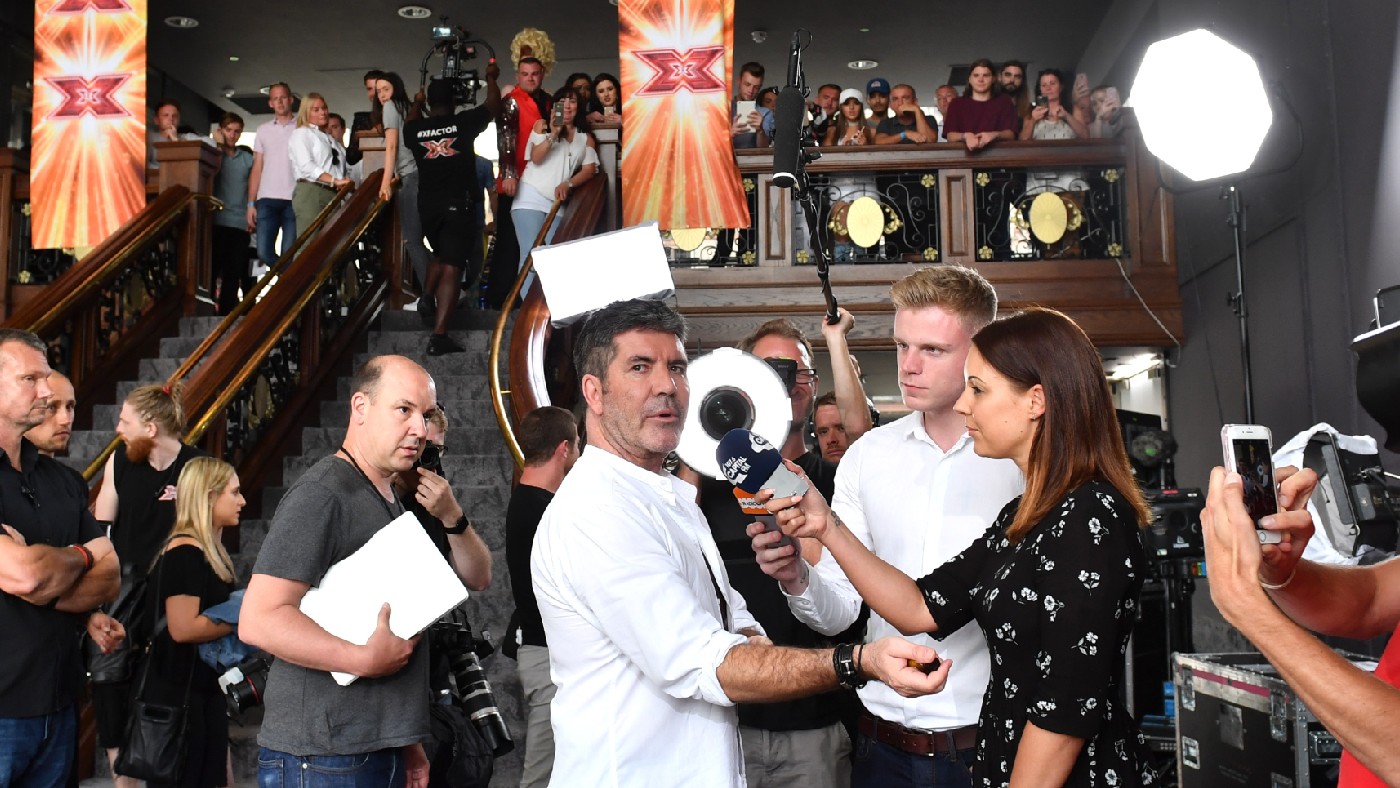The X Factor: farewell to Simon Cowell’s talent circus
The talent show hadn’t actually been on air since 2018, but its death knell was officially sounded last week

A free daily email with the biggest news stories of the day – and the best features from TheWeek.com
You are now subscribed
Your newsletter sign-up was successful
“Like a knackered old cruise singer” finally facing the inevitable, The X Factor has left the stage, said Rebecca Nicholson in The Guardian. The talent show hadn’t actually been on air since 2018, but its death knell was officially sounded last week, with ITV’s confirmation that there are no plans to bring it back.
In its heyday, the show – which ran for 14 years – was a “well-oiled machine for churning out pop stars and Christmas No. 1s”. Its caustic creator and judge Simon Cowell was a pop “kingmaker” who used it to promote mega-acts such as One Direction and JLS. But the world has changed: fans now “like to find music for themselves”, on TikTok or YouTube.
“The X Factor was the last moment where TV reigned supreme, and everyone had to share a screen,” said Sean O’Neill in Vice. It could command the attention of the whole family – of a vast range of different demographics. And it traded on a “moving idea”: that there were “bona fide stars kicking about your sixth form, or working on your dentist’s front desk, just waiting to be propelled into stardom”.
The Week
Escape your echo chamber. Get the facts behind the news, plus analysis from multiple perspectives.

Sign up for The Week's Free Newsletters
From our morning news briefing to a weekly Good News Newsletter, get the best of The Week delivered directly to your inbox.
From our morning news briefing to a weekly Good News Newsletter, get the best of The Week delivered directly to your inbox.
It certainly made for “great telly”, attracting 20 million people on Saturday nights at its peak in the noughties, said Amy Nickell in The Independent. But it was, to a large extent, about laughing at people: to this day, “Worst X Factor auditions” easily outperform “Best X Factor auditions” on YouTube.

And there was a human cost: vulnerable teenagers and people with mental illnesses were exploited for entertainment, with none of the safeguarding that even the most gruesome reality TV shows offer today.
It wasn’t just about humiliation, said Julie Burchill in The Spectator. The X Factor was one of the few places where “a talented working-class kid could make their voice heard – literally”. And it did feature some “breathtaking performances” by such genuinely talented artists as Leona Lewis, Alexandra Burke and Little Mix.
Yes, the desire to wring every last drop of emotion out of contestants’ stories grew cloying. But “in its cheap and cheesy heyday”, the show “communicated more about the human desire to aspire and achieve than any boring old quality drama ever could”.
A free daily email with the biggest news stories of the day – and the best features from TheWeek.com
-
 How the FCC’s ‘equal time’ rule works
How the FCC’s ‘equal time’ rule worksIn the Spotlight The law is at the heart of the Colbert-CBS conflict
-
 What is the endgame in the DHS shutdown?
What is the endgame in the DHS shutdown?Today’s Big Question Democrats want to rein in ICE’s immigration crackdown
-
 ‘Poor time management isn’t just an inconvenience’
‘Poor time management isn’t just an inconvenience’Instant Opinion Opinion, comment and editorials of the day
-
 Bad Bunny’s Super Bowl: A win for unity
Bad Bunny’s Super Bowl: A win for unityFeature The global superstar's halftime show was a celebration for everyone to enjoy
-
 Book reviews: ‘Bonfire of the Murdochs’ and ‘The Typewriter and the Guillotine’
Book reviews: ‘Bonfire of the Murdochs’ and ‘The Typewriter and the Guillotine’Feature New insights into the Murdoch family’s turmoil and a renowned journalist’s time in pre-World War II Paris
-
 6 exquisite homes with vast acreage
6 exquisite homes with vast acreageFeature Featuring an off-the-grid contemporary home in New Mexico and lakefront farmhouse in Massachusetts
-
 Film reviews: ‘Wuthering Heights,’ ‘Good Luck, Have Fun, Don’t Die,’ and ‘Sirat’
Film reviews: ‘Wuthering Heights,’ ‘Good Luck, Have Fun, Don’t Die,’ and ‘Sirat’Feature An inconvenient love torments a would-be couple, a gonzo time traveler seeks to save humanity from AI, and a father’s desperate search goes deeply sideways
-
 A thrilling foodie city in northern Japan
A thrilling foodie city in northern JapanThe Week Recommends The food scene here is ‘unspoilt’ and ‘fun’
-
 Tourangelle-style pork with prunes recipe
Tourangelle-style pork with prunes recipeThe Week Recommends This traditional, rustic dish is a French classic
-
 Samurai: a ‘blockbuster’ display of Japan’s legendary warriors
Samurai: a ‘blockbuster’ display of Japan’s legendary warriorsThe Week Recommends British Museum show offers a ‘scintillating journey’ through ‘a world of gore, power and artistic beauty’
-
 BMW iX3: a ‘revolution’ for the German car brand
BMW iX3: a ‘revolution’ for the German car brandThe Week Recommends The electric SUV promises a ‘great balance between ride comfort and driving fun’